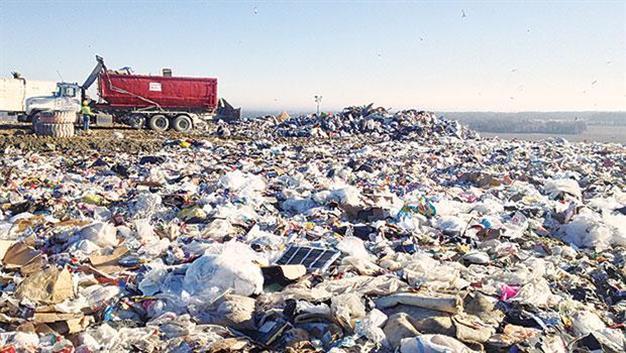Electricity demand of 1 million households can be met from landfill gas in Turkey
Merve Erdil - ISTANBUL

Turkey may produce around 2 billion kilowatt hours (kWh) of power from landfill gas (LFG) if all garbage is collected and used to generate power, according to experts. This volume is equal to 5 percent of the electricity that Turkey generates from Russian gas, but is enough to meet the electricity demand of 1 million households, according to sector representatives.
LFG utilization is the process of gathering, processing and treating the methane gas emitted from decomposing garbage to produce electricity, heat, fuels and various chemical compounds.
There are a total of 20 facilities to produce electricity from LFG in Turkey, according to Ortadoğu Group Energy President Ata Ceylan.
“The use of landfill gas in power generation is both an economic and ecologic solution. The Turkish state offers a minimum purchasing price guarantee for companies which produce electricity from geothermal, wind, solar, hydro and biomass energy sources. Power generation from landfill gas is subsidized at 13.3 percent per kWh in Turkey. The installed power in this area is around 180 megawatts [MW], which meets around 243,000 households’ electricity demands. This figure will increase to 250 MW in the short-term, but Turkey’s potential is much higher. The country can meet around 1 million households’ electricity demands from landfill gas if the whole potential is realized in this area,” he said.
Ortadoğu Group President Mehemt Gür said around 236 billion kWh of electricity was produced in Turkey in the first 11 months of the year, adding that the share of natural gas in the country was around 88 billion kWh.
“The share of Russian gas was around 42 billion kWh in power generation over this year. If all garbage is collected and used to produce electricity, Turkey can meet only around 5 percent of this figure through the LFG system,” he said.
Full potential ‘much higher’
Gür noted the purchasing guarantee in this area was not enough to establish biogas facilities in smaller provinces, adding that a raise in this amount would be quite helpful.
He said the power generation potential in urban solid waste was around 2 billion kWh per year, while animal waste was around 5.5 billion kWh and urban wastewater was at around 0.7 billion kWh.
“When these figures are all included, Turkey’s power generation potential from biogas and bioenergy sources increases to around 18,000 gigawatt hours [GWh] a year. We expect Turkey’s annual energy consumption will be around 260,000 GWh a year by the end of this year. These figures show that Turkey can meet up to 7 percent of its total electricity consumption from its biomass sources. The current production from these sources is just around 300 MW now,” he said.
Gür noted that households create around 26 million tons of waste annually on average, adding that the culture of the separation of garbage in houses has not been developed yet.
 Turkey may produce around 2 billion kilowatt hours (kWh) of power from landfill gas (LFG) if all garbage is collected and used to generate power, according to experts. This volume is equal to 5 percent of the electricity that Turkey generates from Russian gas, but is enough to meet the electricity demand of 1 million households, according to sector representatives.
Turkey may produce around 2 billion kilowatt hours (kWh) of power from landfill gas (LFG) if all garbage is collected and used to generate power, according to experts. This volume is equal to 5 percent of the electricity that Turkey generates from Russian gas, but is enough to meet the electricity demand of 1 million households, according to sector representatives.